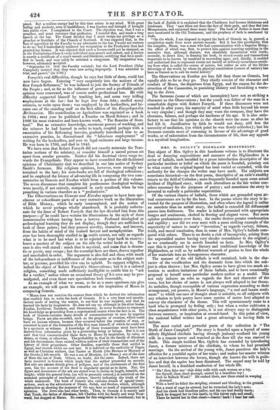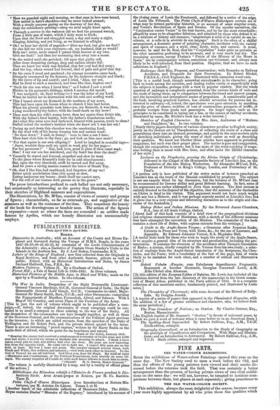MRS. D. OGILVY'S HIGHLAND MINSTRELSY.
Tan object of Mrs. Ogilvy in this handsome volume is to illustrate the dead or decaying superstitions and manners of the Highlanders in a series of ballads, each heralded by a prose introduction descriptive of the particular incident or belief on which the poem is founded, pointing out to what extent the original legend has been varied or extended, with the authority for the changes the writer may have made. The subjects are sometimes historical—as the first poem, descriptive of an exile's stealthy return to the field of Culloden ; more frequently founded upon some actual incident of Highland story, with such alterations as the fair writer con- siders necessary for the purposes of poetry; and sometimes the story is invented to embody a particular superstition.
Of the various classes of ballads, those which are grounded upon ac- tual occurrences are by far the best. In the poems where the story is in- vented for the purpose of illustration, and often where the legend is rather an anecdote than an glottal story, the ballad is extended' till diffusenets passes into feebleness. The reader is indeed presented with appropriate images and sentiments, clothed in flowing and elegant verse. But mere opinion predominates over facts; the reader desires greater condensation and rapidity ; nor did we ever meet with a more striking example of the superiority of nature to man's' "invention," as regards variety, fulness, truth, and moral conclusion, than ht some of Mrs. Ogilvy's ballads com- pared with others. There is no doubt a risk of incongruity, arising from the snperadded matter having very slender resemblance to the original ; as we continually see in novels founded on facts. In Mrs. Ogilvy's ease this is prevented by her literary and traditional knowledge of the Highlanders, as well as by sufficient warmth of genius to fuse the whole of her materials into an homogeneous character.
The manner of the old ballads is well sustained, both in the cha- racter of the versification and the dramatic form into which the sub- ject is often thrown : but Mrs. Ogilvy seems to have given too much at- tention to modern imitations of those ballads, and to have occasionally proposed to herself some particular modern author as a model. This not only induces an echo as regards the flow and character of the verse, but her choice of metre is not always well adapted to her theme. As melodies, though susceptible of various expression according to their arrangement, yet possess, in Moore's language, "a real and innate senti- ment" to which one cast of thought alone is suitable, so all subjects with any relation to lyric poetry have some species of metre best adapted to convey the character of the theme. This will spontaneously come to a bard who is prompted by feeling only ; but when a writer cultivates a close acquaintance with other poets, it is not always easy to distinguish between memory, or inspiration at second-hand. In this point of view, the national ballad writers had a great advantage in having little to imitate.
The most varied and powerful poem of the collection is "The Shrift of Janet Campbell." The story is founded upon a legend of some elderly Highland chieftain having through jealousy confined his young wife in a remote tower and watched at the door till she was starved to death. This simple incident Mrs. Ogilvie has extended by introducing Janet, a former mistress of the chieftain, to whom he had promised marriage. On the arrival of the young wife, Janet perceives the lady's affection for a youthful squire of her train and makes her master witness of an interview between the lovers, though she knows the wife is guilt- less and that the squire has been dismissed. The sequel may be told by Janet herself, in a deathbed confession of her whole life.
"'Hal thou false one' that didst trifle with each woman as a toy,
See thyself, thou churl decrepit, ousted by a beardless boy !
Seek in Balloch Wood ! ' He rushed there, saw them stand in weeping drowned.
With a howl he felled the stripling, stunned and bleeding, to the ground. "Not a word of rage he uttered, but he wrenched the lady's arm; And his cheek had bloodless pallor, and his eye had deadly harm;
Back he dragged her to this castle, to this turret rude and small; There he barred her in that closet—Jeanie ! hark ! I hear her call. "Here we guarded night and morning, we that once in love were bound, Now united in hate's shackles—but we never looked around; With a steady purpose gazing on the doorway of her den, Only for subsistence quitting—sleep we ne'er might know again. "Through a crevice in the wainscot did we feed the prisoned wretch, From a little pan of water, which I daily went to fetch; Upon that she lived and struggled many a day and many a night, Gasping, fainting, and yet living, as we listened in affright " Oh ! to hear her shriek of anguish—' Give me food, but give me food! Or else kill me with your claymore—oh, my husband, that ye would ! Help me ! never, never sinned I 'gainst thine honour or my own. Give me food !' and then her screaming died away into a moan.
"So she wailed until she perished; till upon that guilty cell, After those despairing ravings, deep and sudden silence fell: Then we knew our work was finished, that her soul had fled away; And the boy, whose wound had fevered, died of pain and grief that day.
" By his come I stood and pondered ; for strange memories came back, Strangely summoned by his features, by his eyebrows straight and black; By the curve of lip and nostril; and I cried, Alas, my son, Had he lived to such a manhood, had been like thee, hapless one !
"'Such his sire was when I loved him !' as I looked I saw a scroll
Hidden in his garment's foldings, which I careless did unroll; 'T was unsigned; oh, fatal writing!—'t was the letter of my Lord, When he hurled me to destruction with his cold and scoffing word.
"This I bound about my Kenneth in the madness of my scorn, This had been upon his bosom when to church I him had borne, When his gloomy grandsire took him—yes, my Kenneth, it was thou, Lying murdered by thy father, with his hand-mark on thy brow "Thou wart then his wife's young lover, thou her squire from Erin's isle, With thy father's fatal beauty, with thy father's treacherous smile; Ah ! what film mine eyes had darkened, bleared with passion, truth to shun ? Dulled indeed the mother's instinct when she knew not 't was her son "Pacing up and down this chamber was the unrelenting Lord, By the dead wife of his bosom keeping late and useless ward:
Go thou down ! ' I said, in frenzy: once to thee a soul bore;
Thou heat slain him in thy fury; go, and look on him once more !
"For that squire is our own offspring !' Loud he laughed in scornful rage-
' Janet, wouldst thou melt my spirit to weak pity for her page—
For her paramour?" Nay, look here, proof is plain if thou canst read: Man! I say our son lies murdered, and thy hand has done the deed!'
"Vacantly he stared and listened, stupefied and slow he went To the place where Kenneth's body lay in cold abandonment: But, upon the very threshold, swift he turned and fled away, And for years a raving maniac roamed the terror of Strath Tay.
"Oh, that I like him had maddened, had forgotten all my wo! Better quick annihilation than this agony so slow, Eating cankerous my bosom: death itself me cannot save,
For the evil of ouecourses doth pursue us in the grave."
The prose introductions prefixed to each ballad are not only necessary, but occasionally as interesting as the poetry they illustrate, especially in their sketches of Highland manners and superstitions.
Mc illustrations, by Mr. Wien, consist of views of scenery and groups of figures ; characteristic, so far as externals g,o, and suggestive of the manners as well as the costumes of the time. 'They constitute the beauty of the book for drawingroom or boudoir uses. The action of the figures is expressive—most so where the faces are concealed : an artifice made famous by Apelles, which our homely illustrator not unsuccessfully employs.



















































 Previous page
Previous page